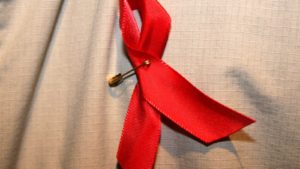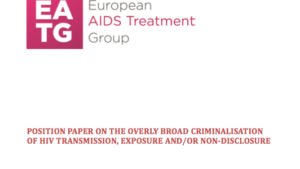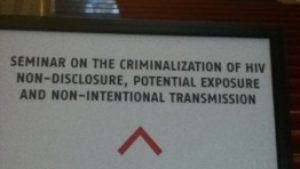Overview
The Finish Criminal Code does not have an HIV-specific provision, but other sections of the Code have been applied to cases of HIV ‘exposure’ and transmission. These include sections 1 (manslaughter), 2 (murder), 5 (assault), 6 (aggravated assault), and 13 (causing danger/imperilment) of chapter 21 (homicide and bodily injury). There is no legal duty to disclose HIV-positive status but notably, there have been no prosecutions to date where a person is known to have disclosed HIV-positive status before unprotected sex. Both negligent and ‘intentional’ exposure and transmission have been criminalised.
HIV criminalisation cases in Finland are not made public until they reach the Supreme Court so there are limited data available. For various reasons, some cases are never published, so it is impossible to know the full extent of HIV criminalisation in Finland. However, it is understood that there have been around 20 cases, with the first Supreme Court decision made in a 1993 case involving a gay couple in which the person living with HIV was convicted of manslaughter after he transmitted HIV through unprotected sex and allegedly failed to disclose his status. Subsequent cases have more frequently involved people of colour and sex workers. In most instances, people have been charged with imperilment or assault, depending on whether or not condoms have been used and whether transmission has occurred. However, convictions of manslaughter and attempted murder have also been secured, such as in the first case in 1993, and a 1996 case in which an African American man was sentenced to 14 years’ for attempted murder and later deported, for allegedly having unprotected sex without disclosing his status.
Three recent cases have resulted in the Supreme Court handing down precedent-setting judgements on the scope of HIV criminalisation in Finland, which have seen the position on liability for HIV ‘exposure’ where the accused is on effective treatment developed significantly.
The first case (KKO:2015:83) resulted in the Supreme Court rejecting the position that being on effective treatment was sufficient to preclude liability. The case related to an HIV-positive man who had been convicted of imperilment by Helsinki District Court after having unprotected anal intercourse on multiple occasions with his sexual partner without disclosing his HIV-positive status. HIV was not transmitted. The Court was asked to rule on whether the accused had placed his sexual partner ‘in serious danger of losing his life or health’ as required under a charge of imperilment. The accused stated his belief that, per the Swiss Statement, he could not transmit the virus while on effective treatment, but the court found he should not have made that assumption, referring to Finnish policy which requires disclosure. The case was referred to Helsinki Court of Appeal which upheld the initial ruling. The appeal to the Supreme Court found that when considering negligence, it is necessary to consider the risk of transmission and to also take into account the HIV-positive person’s understanding of their own condition. The Supreme Court found the likelihood of transmission when a person is on effective treatment can ‘be considered to be extremely low’. Still the Supreme Court found that the accused was guilty of imperilment because he had placed his partner in serious danger of losing his health, had undertaken the risk knowingly, and his negligence could be deemed to be ‘gross’. Despite having an undetectable viral load, the decision held that the accused had failed to take due care by disclosing his HIV-positive status and also using a condom. Two of the five judges dissented.
The second case (KKO:2015:84) established a new precedent that being on effective treatment can preclude liability in some instances. It related to an HIV-positive man who had been convicted by Western Uusimaa District Court of aggravated assault. The charge related to a single instance of sex with a female partner who was not aware the accused was HIV-positive. The accused said he had used a condom but the woman said he had not, and the court agreed no condom had been used. HIV was not transmitted. Importantly, aggravated assault can only be proven if an act was intentional, which includes that the consequence would ‘quite probably result’ from the alleged action. An initial appeal to the Turku Court of Appeal was unsuccessful. The appeal to the Supreme Court considered how being on effective treatment (and having an undetectable viral load for at least five years) would affect knowledge that HIV transmission would quite probably result. The Court found that treatment had reduced the risk of transmission to a point low enough that it was more probable that HIV would not be transmitted, and dismissed the charge of aggravated assault. It is not clear whether this would apply in cases involving charges under other provisions.
A third case in 2021 confirmed the Supreme Court’s previous ruling and firmly established the precedent that an actual risk of harm is an essential requirement for a conviction for perceived ‘exposure’ to HIV. In this case, a man was charged for aggravated assault for having unprotected sex without disclosing his HIV-positive status to his partner. However, the accused was on effective treatment and HIV was not transmitted. The defendant had been convicted in the Court of Appeal but the Supreme Court overturned this ruling, stating that because the man had been receiving effective treatment for years the risk of infection was extremely unlikely or even eliminated, and therefore the threshold for this offence had not been met. The result of this ruling is to confirm that the elements required for prosecutions for perceived ‘exposure’ to HIV are not met where the accused is on effective treatment and HIV is not transmitted.
There is still some uncertainty about whether using a condom without disclosing HIV-positive status is enough to preclude prosecution, as it has previously been noted that ‘safer sex is not [considered] 100% risk free’.
Laws
Criminal Code
Chapter 21 (578/1995)
Homicide and bodily injury
Section 1 – Manslaughter (578/1995)
A person who kills another person shall be sentenced for manslaughter to imprisonment for a fixed term of at least eight years.
An attempt is punishable.
Section 2 – Murder (578/1995)
If manslaughter is committed
(1) with deliberate premeditation,
(2) in a particularly brutal or cruel manner,
(3) by causing serious danger to the public, or
(4) by killing a public official on duty maintaining public order or security, or because of an official duty,
and the offence is also aggravated when assessed as a whole, the perpetrator shall be sentenced for murder to life imprisonment.
An attempt is punishable.
Section 5 – Assault (578/1995)
(1) A person who employs physical violence on another or, without such violence, injures the health of another, causes pain to another or renders another unconscious or into a comparable condition, shall be sentenced for assault to a fine or to imprisonment for at most two years.
(2) An attempt is punishable.
Section 6 – Aggravated assault (654/2001)
(1) If in the assault .
(i) grievous bodily injury or serious illness is caused to another or another is placed in mortal danger,
(ii) the offence is committed in a particularly brutal or cruel manner, or
(iii) a firearm, edged weapon or other comparable lethal instrument is used and the offence is aggravated also when assessed as a whole,
the offender shall be sentenced for aggravated assault to imprisonment for at least one year and at most ten years.
(2) An attempt is punishable.
Section 13 – Imperilment (578/1995)
A person who intentionally or through gross negligence places another in serious danger of losing his or her life or health, shall be sentenced, unless the same or a more severe penalty for the act is provided elsewhere in the law, for imperilment to a fine or to imprisonment for at most two years.
Further resources
2015 Supreme Court decision KKO:2015:84
2015 Supreme Court decision KKO:2015:83
Brochure, published by HIV Nordic, highlighting key questions on HIV transmission and exposure criminalization for people living with HIV in Denmark, Sweden, Finland, Norway and Iceland.
Acknowledgements
Our thanks to Australian law firm Hall & Wilcox for their assistance with current relevant legislation.
HIV Justice Network's Positive Destinations
Visit the Finland page on Positive Destinations for information on regulations that restrict entry, stay, and residency based on HIV-positive status, as well as access to HIV treatment for non-nationals.



